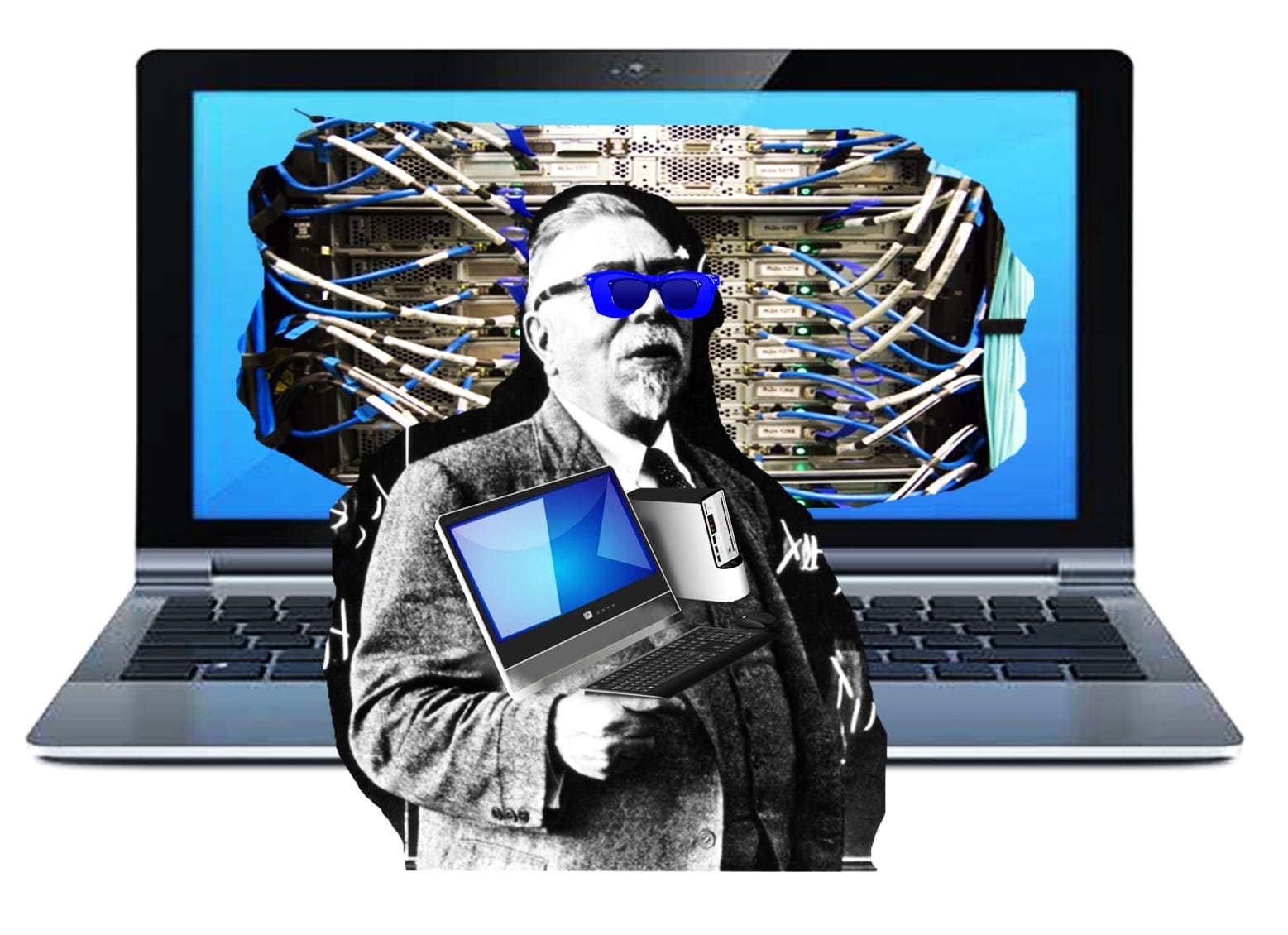Anticipating the Coast (and Reflecting on Cyberpsychology)

The inland heat was more than I had anticipated, persistent and overbearing but helpful for the quiet time it provided. For the last week, I have walked the dogs and chatted at length with a neighbor, a woman from New York who tours the nation in her class C motorhome. With this in mind, I regard my current experience of nomadic life and look forward to arriving at the coast.
There is, at once, a peacefulness and a sense of ennui for a wanderer, the joy of adventure often outweighing the difficulties of travel. True, it's something of a mixed bag of experiences. According to the change of seasons, one discovers new destinations or returns to old favorites, the forest during summer monsoons, the desert for days of winter sunlight. And this brings us to a very important point; the environment remains a deciding factor, determining how comfortable one will be either in the heat of July or during the storms of late January.
Even with the best motorhome, temperatures below zero or over one hundred will likely pose issues. Add to that the inherent risks of travel in isolated places, and you have an exciting life as a nomad, to be sure. Now, let's digress in order to consider the mental aspects of life on the road, as opportunities for reflection abound during long drives.

After many hours on the highway, in the company of speeding trucks, questions about the nature of life and freedom can arise spontaneously. Indeed, I often find myself exploring such avenues of thought, traveling through the desert or exploring forest roads of the north. While entering Southern Oregon from Idaho, I considered how our lives interact with electronic media and change us in ways previously unimagined. Let's investigate this theme together.
We begin with an important figure in the realm of technology and analyze how his work influences our daily lives.
Norbert Wiener: Cyberpsychology in Perspective

It seems that we have no shortage of experts in the media these days, informing (and often indoctrinating) the public on all manner of subjects. Here, we must remember that these academics and think tank researchers have predecessors, one of whom is Norbert Wiener, the genius who devised the logic-based infrastructure of modern information technology. From MIT we learn:
In his lifetime, Wiener was best known for Cybernetics, a book he published in 1948, when he was in his mid-50s, which attempted to unify the study of biological and electromechanical systems through common principles of feedback, communication and control. The book’s title — Wiener’s own coinage, from the Greek for “steersman” — lives on in words like “cyborg” and “cyberspace,” and researchers in a host of disciplines drew inspiration from Wiener’s syncretic vision. (1)
With this, we have an understanding about the term cybernetics, and the degree to which the subject of communication and control was becoming pivotal, even at midcentury.
From Wiener himself we learn:
The ideal computing machine must then have all its data inserted at the beginning, and must be as free as possible from human interference to the very end. This means that not only must the numerical data be inserted at the beginning, but also all the rules for combining them, in the form of instructions covering every situation which may arise in the course of the computation. Thus the computing machine must be a logical machine as well as an arithmetic machine, and must combine contingencies in accordance with a systematic algorithm. (2)
He preceded this assessment in brilliant fashion, by articulating the role of computing machines, noting that they record numbers, perform operations, and provide results in a numerical format. With that, we have the binary aspect of machine intelligence, and the meta-recording of computational results which we can, subsequently, analyze by performing new operations and so on. In theory, this process can extend indefinitely, on and on into the long night of information technology. You get the idea. For those interested in delving further, I will provide a list of books at the end of this piece. At the moment, we must consider another aspect of Wiener's research, pertaining to human beings and how we relate to this numerical realm.
Who Needs People? (And People Who Need Freedom)
During the historic Macy Conferences of the postwar era, Wiener was at the forefront of cybernetics. Along with scholars from various disciplines, he labored to plan our future relationship with machines, paving the way for unregulated artificial intelligence, the vast influence of Bill Gates, and, by extension, the continuation of eugenics--vaccine mandates, turbo cancers, and the rise of sudden adult death syndrome now becoming the norm. Clearly, the human use of human beings has taken a rather dark turn since the postwar years, when the Macy clan sponsored those conferences.

Although the power structure appears to dislike people--quite a bit--we ordinary folk need and value one another. Moreover, we also have an innate need for freedom. So, how does nomadic life respond to all of these issues, to the rise of technocracy, the need for freedom, and the hope we have for companionship? The short answer is that one can find personal answers to all such questions rather easily while traveling in an RV, meeting people along the way and having adventures. Undoubtedly, this lifestyle inspires one to think and reflect. And what else have I learned during my travels? The nature of life on the road continues to inform and inspire my outlook, and the theme of constant change is key. Also at issue, however, is the reality of isolation.
Further musings . . .
Many nomads thrive on change and the exhilaration of the outdoors, seeking alternatives to the life we were offered by Wiener and his associates. And yet, in paradoxical fashion, the experience can be isolating as well as convivial. For my part, I have noticed that one tends to find like-minded individuals while visiting campgrounds and RV parks, engaging in organized activities, or sharing campfire chats with new acquaintances. As a side note, I must say that I find the viewpoints of people in Arizona, Utah, and Idaho to be refreshing after having lived for so many years in California. At any rate, let's explore a working definition of cyberpsychology to see how it informs our understanding of cybernetics and Norbert Wiener.
The University of East London: A Cyberpsychology Program Emerges
In a brief but informative introduction to the discipline, lecturers from the University of East London provide us with the basics. Their YouTube video, which I will link at the end of this essay, begins with a simple inquiry. Paul, one of the featured scholars, asks about the first thing we do in the morning. According to him, if we check our phones upon beginning the day, we have demonstrated the extent to which technology pervades our lives. And, by extension, we must understand how this union with gadgets and interfaces impacts our minds.

The rapid advancement of technology is staggering. What is far more important, in my view, is the extent to which recent innovations have now become indispensable. As Ian Wells points out, "An enormous amount of our behavior is now based around products and services that didn't even exist just a few short years ago." (3) Beyond this, we must analyze the nature of our connection to Google, Facebook, iPhones, and Zoom, deciding whether it is mainly beneficial (or detrimental) or even neutral to some degree. In short, these are some of the issues scholars of cyberpsychology explore. During the Macy Conferences, did anyone foresee the rise of so much invasive technology? To what degree did conference participants engineer our brave new world of electronic engagement--and, if so, for what purposes?
These are subjects I consider deeply, and with great concern, as I continue to explore the landscape in my motorhome. Now, we return to the subject of Wiener and his grand vision of technology.
The Human Use of Human Beings (Wiener's Cyberpsychology Contributions)
Ideally, the machine is there to aid human beings. However, Wiener's tone often implies that human intervention is a mere encumbrance, a bit troublesome for the computers. Yes, people can indeed interfere with the recording of numbers and perform operations incorrectly. And even the best mathematician is far less efficient than a modern computer. How, then, should we exist with machine intelligence? What is our role? These questions bring to mind the book for which Wiener is often remembered by the general public, The Human Use of Human Beings: Cybernetics and Society. Although beyond the scope of our current discussion, this book explores our potential relationship to technology, wherein we find cyberpsychology to be of key importance. Here, I find it helpful to include an extended quotation from Wiener:
WHAT IS CYBERNETICS?
I have been occupied for many years with problems of communication engineering. These have led to the design and investigation of various sorts of communication machines, some of which have shown an uncanny ability to simulate human behavior, and thereby to throw light on the possible nature of human behavior. They have even shown the existence of a tremendous possibility of replacing human behavior, in many cases in which the human being is relatively slow and ineffective. We are thus in an immediate need of discussing the powers of these machines as they impinge on the human being, and the consequences of this new and fundamental revolution in technique.
To those of us who are engaged in constructive research and in invention, there is a serious moral risk of aggrandizing what we have accomplished. (4)
Interestingly, his tone appears to shift somewhat, as he introduces a moral aspect to his research and ponders the ramifications of human/machine interface. All of this begs an essential question: What does it truly mean to be human? Are we just messy and inefficient creatures that fall prey to our emotions, whereas machines have no such weaknesses? As we have seen in recent years, corporations and governments answer in the affirmative. How can we understand this situation and address it effectively? Wiener provided us with important considerations in the above passage.
The problem is that the moral imperatives which must, in no small manner, underwrite civil society have not kept pace with the developments of high technology. So, as long as regulations don't keep the technocracy in check, humanity will encounter a host of dark challenges, privacy and medical ethics being chief among them. Now, let's consider the actual quality of our rising technology; how do machines and technical processes compare to mankind, the thinking, feeling creations of the Lord Jesus Christ?
Machine intelligence is, at the end of the day, no better than the human programming that gives rise to it. And, as we know, gadgets have a way of malfunctioning, requiring human skill for their repair. Moreover, people are privy to intuition, a spiritual level of awareness which remains beyond ordinary computing capability. Let's go a bit further with this line of inquiry as we conclude.
Machines and the Self

Selfhood, as a grand theme of existence, has a long history. Now, in the age of automation and high technology, it takes on myriad new dimensions as questions abound. What, exactly, is human consciousness? And to what extent can it be mimicked by technology and used for the benefit--or detriment--of the population? Again, we find ourselves confronted with a vast topic, too extensive for our current discussion. However, if we return to the work of previous generations, and study their books and articles, we can learn much.
Now, back to the genius we mentioned previously . . .
Norbert Wiener, known as the father of cybernetics, can count the emerging discipline of cyberpsychology as his descendent. And his brainchild has left us with numerous areas of research which must be addressed, not least for the sake of ethics. How do we engage technology on a daily basis? How does it shape our minds and influence the quality of our lives? These questions, often considered by experts in the field of cyberpsychology, might help us to redefine selfhood in the age of high technocracy.
Concluding Thoughts

After much joyful anticipation, I reached the coast, where cool beaches, fog, and chats with local fishermen awaited me. Gold Beach is a wonderful destination. During long walks at the shore, I contemplated the material for this essay, arriving at my conclusions in the brisk afternoon air. Yes, we are here for reasons that transcend the role of our inventions, whether our technologies are used for good or for ill, for the enrichment of life or for agendas of destruction. And this leads to my summation.
Regardless of technological advancements, and the use of machines as instruments of oppression, people--billions of men, women, and children--remain at the center of God's plan. And that will never change.
Works Cited:
(1) Hardesty, Larry. "Prodigy of Probability" (MIT News Office, January 19, 2011).
(2) Wiener, Norbert. Cybernetics (or Control and Communication in the Animal and the Machine) (New York: John Wiley and Sons, Inc., The Technology Press, 1948) p. 139.
(3) "Cyberpsychology Introduction" (The University of East London, August 12, 2022)
- Please enter the following into your YouTube browser to access the video: Cyberpsychology Introduction East London University
(4) Wiener, Norbert. The Human Use of Human Beings: Cybernetics and Society (Boston: Da Capo Press, 1988) p. 1.
For Further Reading:
Flow Conway & Jim Siegelman. Dark Hero of the Information Age: In Search of Norbert Wiener (New York: Basic Books) 2005.
Jayne Gackenbach & Johnathan Brown, Editors. Boundaries of Self and Reality Online: Implications of Digitally Constructed Realities (London: Academic Press, an Imprint of Elsevier) 2017.
Maslow, Abraham H. A Theory of Human Motivation: A Psychological Research that Helped Change the Field for Good (New Delhi, India: General Press) 2022.
Pias, Clause, Editor. Cybernetics: The Macy Conferences, 1946-1953: Transactions (Zurich: Diaphanes) 2016.
Skinner, B. F. Science and Human Behavior (New York: Macmillan) 1953.
Monica T. Whitty & Gary Young. Cyberpsychology: The Study of Individuals, Society, and Digital Technologies (Place of Publication not Identified: The British Psychological Society) 2016.